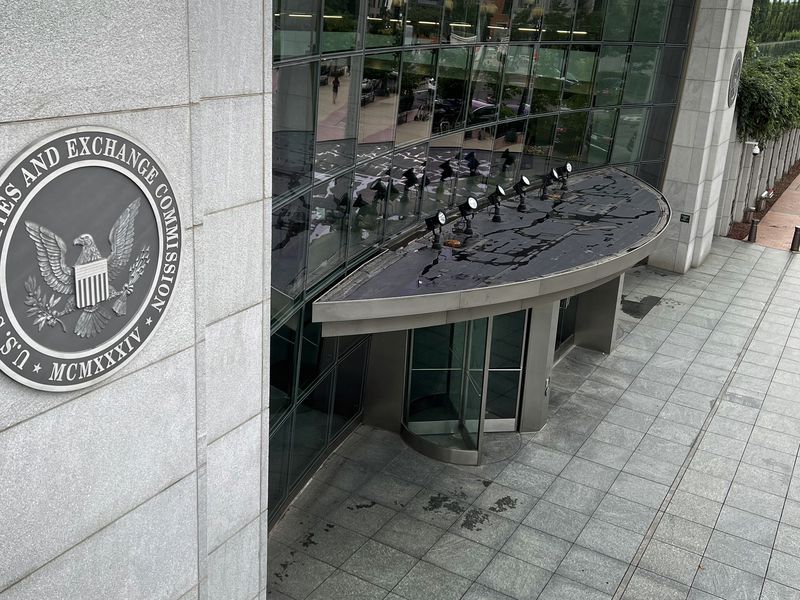Bitcoin ETFs: The Bear Case
Bitcoin’s price action last year (more than doubling in 2023) was driven, in large measure, by a rebirth in interest in spot bitcoin exchange-traded funds (ETFs). BlackRock’s unexpected filing with the U.S. Securities and Exchange Commission (SEC) in June drove attention to the asset, which was one of the year’s best performers notching over 100% gains.
Now, with a bitcoin ETF expected to be approved this week (as early as today), many are looking to “sell the news” of BTC’s good fortune.
This is an excerpt from The Node newsletter, a daily roundup of the most pivotal crypto news on CoinDesk and beyond. You can subscribe to get the full newsletter here. For the bull case for Bitcoin ETFs, see here.
It remains an open question whether the SEC will approve one or many of the dozens of open spot bitcoin ETF applications, though a denial is still in the cards. Bitcoin ETFs remaining in limbo, i.e. the status quo, might not even be bad for crypto. In fact, live bitcoin ETFs may not be everything market watchers are banking on; they may even be a net negative for the industry.
No doubt, a bitcoin ETF would be a signal of maturity for all of crypto (I covered the bull case here). And that is exactly what antagonistic politicians including Sen. Elizabeth Warren (D-MA) and skeptical regulators like SEC Chair Gary Gensler are worried about. This was exemplified by a last-minute open letter from Better Markets, an organization with ties to both, which claimed a bitcoin ETF would legitimize an industry rife with fraud.
Is crypto ready for that?
Although a court ruling last year is forcing the SEC’s hand to make a determination about bitcoin ETFs by Jan. 10, it’s worth taking some of the agency’s historical concerns over crypto ETFs seriously. Essentially, the SEC has held out approving a bitcoin ETF ever since the Winklevoss twins first filed to launch one a decade ago, because of concerns around market manipulation.
Manipulation is typically a concern for ETFs that track indexes (or baskets of different assets), because there can be a difference between the benchmark asset prices and the daily disclosures provided by ETF managers that can be exploited by those with inside information of the indexes. However, a similar problem could arise based on how bitcoin’s price is formulated.
Because bitcoin is decentralized, there isn’t a single price of bitcoin. Instead, its dollar value is often calculated by averaging the current going price of bitcoin on a few trusted exchanges. However, even on established exchanges, it’s not unheard of for investors to drive crypto prices up or down deliberately or accidentally with large trades, opening arbitrage opportunities.
This type of market manipulation presents not much of a concern for the vast majority of crypto traders today, and likely won’t be for most potential bitcoin ETF investors. But it could be a bigger problem once The Quants get involved. BlackRock was the first to suggest a “surveillance-sharing agreement” via crypto exchanges to assuage SEC fears, but not everyone is convinced it will work.
Further, putting aside the privacy concerns of increased market surveillance, there’s also the broad question around who truly benefits from bitcoin ETFs. Exchange-traded funds often raise the cost of their underlying backing assets. This seems like a win-win for bitcoin holders, until you consider what this means for commodities like gold and oil, which are both investments and goods that have a cost to use.
In other words, what is the long term impact on Bitcoin’s useability if 1 BTC = $1 million? What would those fees look like? It’s true bitcoin is divisible into satoshis, that 1 BTC will always equal 1 BTC. But wouldn’t many people eventually, simply be priced out — particularly those in the developing world bitcoiners want to “bank?”
And that essentially is the nut of the issue: Bitcoin, by its sheer force of being, invites a culture clash between the haves and the have-nots. Doesn’t the possible success of a bitcoin ETF sell out the original vision for a system that stands outside of The System?
What is a bitcoin ETF? It’s a share representing BTC that could end up in millions of peoples’ 401(k)s via a product managed by the world’s largest asset manager using coins custodied by an outside company (Coinbase is the leading custodian to U.S. ETFs). In other words, it’s not a “gateway to adoption”; it’s a corruption of the idea that, through self-custody, one can take control over our own money.
There are certainly shades of gray here, especially considering that open protocols by definition can be used by whomever. In that sense, BlackRock’s encroachment doesn’t make Bitcoin any less peer-to-peer. But there are unanswered questions about what the growing influence of Wall Street in Bitcoin means for the protocol, whether the influx of money will change the realities of Core development or bitcoin mining.
There are tradeoffs to everything. And it remains to be seen what it will cost to bring Bitcoin “mainstream.”
Edited by Benjamin Schiller.









